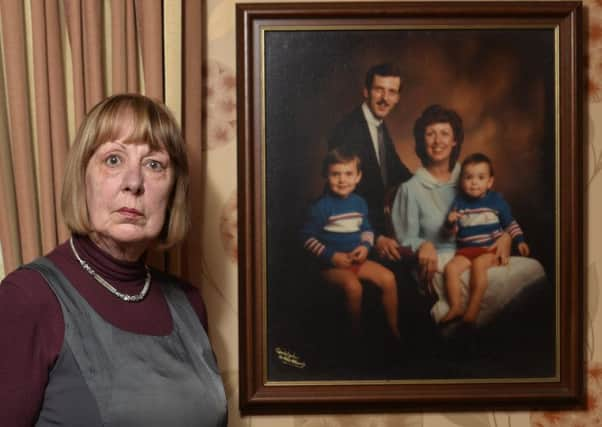RUC widow: Martin McGuinness died with his family, my husband died in a ditch


Former deputy first minister McGuinness died on March 21 in a Londonderry hospital with his family by his side. A former IRA leader, he was widely lauded after his death for his efforts to bring peace.
By contrast, Avril Anderson said that her husband, RUC Inspector Billy Wilson, died along with three other officers when the IRA targeted them with a roadside bomb at the Kileen border crossing on May 20, 1985 – a period when Mr McGuinness was understood to be the IRA’s Northern Commander.
Advertisement
Hide AdAdvertisement
Hide AdConstables Tracy Doak and David Baird and Reserve Constable Steven Rodgers were also killed as the four officers escorted a Brinks-Mat security van coming north.
Mrs Anderson, who lives in the Lisburn area, paid a heartfelt tribute to her husband.
“He was a really good husband and a terrific father,” she told the News Letter. “Our boys were only three and two when he was murdered.”
Her last memory of her husband was of him leading their toddlers in a march in their roof space, to the tune of ‘The Grand Old Duke of York’.
Advertisement
Hide AdAdvertisement
Hide Ad“They were stamping their feet as hard as they could. He was just a wonderful person.”
But Mrs Anderson felt sorrow at the contrast in how Mr McGuinness and her husband died.
“Some hailed him [McGuinness] as a hero – but in my eyes he was no hero. In my eyes he did more harm and more bad than he ever did good.
“He had the dignity of dying with his family around him. My husband did not have that, we didn’t have that privilege.
“He was in a field, well, the side of a ditch really.
Advertisement
Hide AdAdvertisement
Hide Ad“They would have been able to have their coffin open. We didn’t have that privilege.
“And he had the privilege of living until 66 years old. My husband got to 28 years old. I don’t think there is any justice in that at all.”
She is not convinced by arguments that nobody else could have led the IRA to a peaceful past.
“Who is to know that? I mean, I don’t know if politics was a cover for him still carrying on in that role. Nobody knows.”
Advertisement
Hide AdAdvertisement
Hide AdHer husband’s injuries were too devastating for an open coffin.
“I don’t know what was in the coffin. We went to the inquest and were told his injuries were just horrendous. He was killed instantly.”
Nobody was ever charged with the attack. She tries not to the give the killers “space in her head”.
“Even if they were convicted what would they get? A life of luxury in prison?
Advertisement
Hide AdAdvertisement
Hide Ad“My husband wasn’t just a uniform, a policeman and a target. He was a human being, not just a policeman.”
l Mrs Anderson recently took part in a ‘Hymns of Faith and Hope’ service at St Mark’s Church in Armagh. The event raised funds for ‘The Co Armagh Memorial Wall’ to commemorate all security force members murdered in the county. See: www.armaghmemorial.org